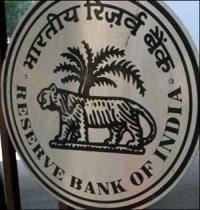 | « Back to article | Print this article |
Time for RBI to pause, say economists
September 20, 2011 11:46 IST
 Though the Reserve Bank of India continued its hawkish stance during the mid-quarter review of monetary policy last week, and declined to give any signs of pause, economists have started advocating as concerns over domestic growth deepen coupled with heightened global macroeconomic uncertainty.
Though the Reserve Bank of India continued its hawkish stance during the mid-quarter review of monetary policy last week, and declined to give any signs of pause, economists have started advocating as concerns over domestic growth deepen coupled with heightened global macroeconomic uncertainty.Seven of the 10 economists Business Standard spoke to say the time had come for pressing the pause button.
RBI had said last week it would continue with the monetary tightening till the inflation trajectory showed a downward trend.
Shubhada Rao, chief economist at YES Bank, said: "We see a case for pause in the tightening of rate increase by RBI building up, as the sequential momentum of core inflation is easing. Unless there is a sharp rise in commodity prices, we do not see a fresh trigger to the current inflation trajectory."
With downward risks to growth, RBI could well pause from here on, Rao added.
Economists also argued that the effect of last week's rate rise would only come with a lag, and by that time, both growth and inflation would come down considerably.
While RBI has maintained its projection for eight per cent growth in 2011-12, it has said there are downside risks to that estimate.
In addition, economists see March-end inflation at six per cent, lower than RBI's guidance of seven per cent.
"Going forward, the odds favour a pause in rates for now but key factors shaping policy decisions would be domestic growth, global financial conditions and domestic inflation trends, which would largely be determined by the interplay of commodity and currency movements," says Rohini Malkani and Anushka Shah, economists at Citigroup.
RBI's hawkish stance continues at a time when central banks in countries like China, the Philippines, the UK and Malaysia have opted for a pause, while Brazil
has cut rates, on the back of a deteriorating global macroeconomic environment.
"Fiscal consolidation is the need of the hour, which RBI hinted at when it spoke of cutting down the cash reserve ratio and statutory liquidity ratio.
Monetary policy cannot work beyond a point and pausing monetary tightening will be a prudent decision, given the nature and source of current inflationary pressures," said Jay Shankar, chief economist, Religare Capital Markets.
Analysts also said there was no convincing reason for further rate increases by RBI. It would not help tame inflation, but might put the economy in a vicious circle of slow growth and high inflation, economists said.
The central bank may also consider a pause due to pressure from various government departments, say experts.
"Although it will be logical for RBI to maintain its anti-inflationary stance as long as core inflation is high, pressure from other government offices makes a case for pause in the rate hike by the regulator," said Madan Sabnavis, chief economist at Care Ratings.
While many have prepared a case for pause, others feel RBI may go for another 25-basis-points increase in October before giving a breather to the economy.
"We cannot rule out another 25-basis-points hike by RBI in line with its anti-inflationary stance," said Samiran Chakraborty, regional head of research at Standard Chartered Bank.
A reversal of the inflation trajectory was expected but risks were to the upside, said Mole Hau of BNP Paribas.
However, Mole also said BNP Paribas would continue to stick with its current projection of repo rate at 8.25 per cent as monetary policy operates with a lag and that inflation should start wearing off by the end of this financial year.
"We, therefore, stick with our forecast for 8.25 per cent as the peak and for RBI to remain on hold in the balance of the year and early next year," Mole said.
